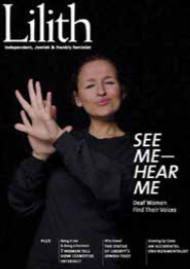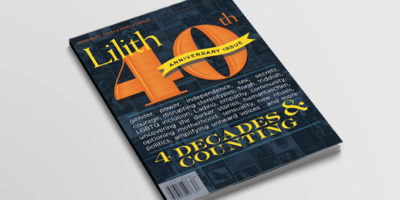
from “Deaf Jewish Women Make Themselves Heard”
In the magazine’s ongoing commitment to the narratives of often marginalized women, in their own words, a special section on being deaf, Jewish and female introduced women leaders in the Deaf community, the need for signing at all Jewish events, and a surprising bias in the academy. [Spring 2012]
 Three women highlight dynamics experienced by deaf Jews, often marginalized by religious practice and by the inaccessibility of Jewish functions.
Three women highlight dynamics experienced by deaf Jews, often marginalized by religious practice and by the inaccessibility of Jewish functions.
Tzila Seewald-Russell, 25, says, “I would consider myself deaf (with a lower-case d). Even though I’m main- streamed —which I’m grateful for because it’s allowed me to involved in my synagogue—I still can’t totally follow every- thing in shul. I don’t feel like I’m a part of Deaf culture, though, because I didn’t grow up in it. I didn’t learn A.S.L.” She often feels split between deaf and hearing worlds, and told Lilith how lucky she feels that her parents decided on a cochlear implant, immersing her in Jewish schools and camps that wouldn’t otherwise have been accessible for her.
Bernice Farr, on the other hand, is deeply embedded in Deaf culture within the Jewish community. A third-generation Deaf Jewish woman, she expresses in American Sign Language (A.S.L.), through a video-relay service, how proud she is that her son and grandchildren attended Gallaudet, the leading university for Deaf and hard-of-hearing students. Asked about cochlear implants for her children or grandchildren, she emphatically declared, “They were born Deaf and should stay Deaf. We’re just Deaf —that’s all—the rest of us is the same. I’m happy being Deaf. There’s nothing wrong with me….implants are cruel because they spoil the experience of being deaf and force people into the mainstream.”
Alexis Kashar, 45, grew up in a three- generation deaf family, and her deaf parents made it a priority for her to be bilingual in A.S.L. and English. She and her whole family, even her hearing sister, felt excluded from synagogue and Jewish events. As her own children, who are not deaf, were growing up, she began exploring synagogues. Some asked her to “partner”—in other words, said Kashar, to share the expense. “It is like telling someone in a wheelchair to bring your own ramp.
“I was able to get subsidized interpreters everywhere —from law school to law practice. Everywhere, except for synagogues! I could become anything I wanted to be—but not a Jew.” The Americans with Disabilities Act doesn’t cover religious institutions.
Kashar emphasized access, which includes having a hearing amplification system, captioning and/or interpreters, and she announced that funders have the power to tell organizations to make this a priority. “If synagogues have budgets for flowers, they can do this, too.”


